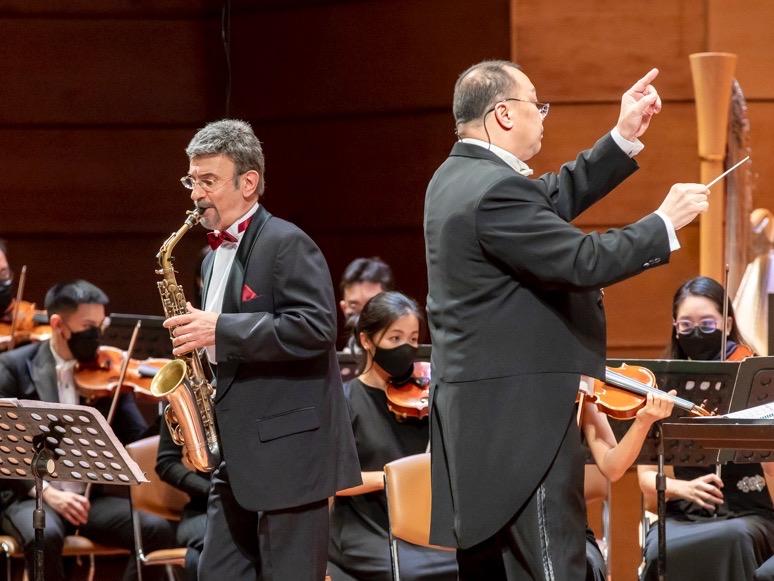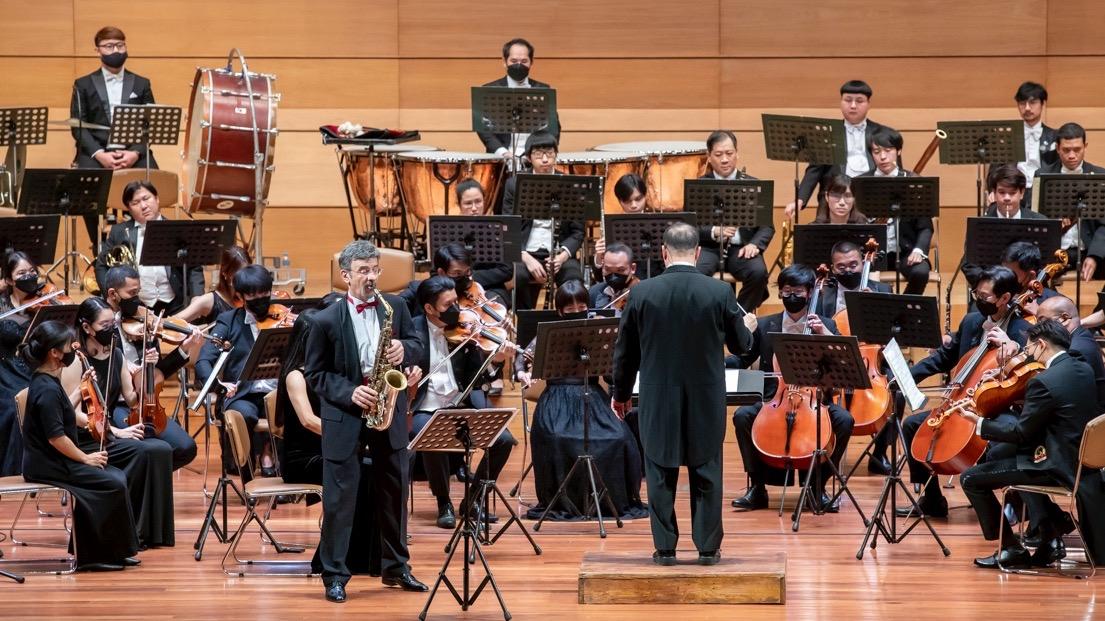To celebrate the auspicious occasion of King Vajiralongkorn's 70th birthday on July 28, a fantastic, brand new Concerto For Alto Saxophone And Orchestra was commissioned and performed by the Royal Bangkok Symphony Orchestra (RBSO) at the Thailand Cultural Centre on July 22. Composed by Thailand's foremost classical composer Prof Narongrit Dhamabutra, the soloist was a musician of truly worldwide stature, the Greek virtuoso Theodore Kerkezos.
Narongrit's musical style is typically full of vitality and sparkling orchestral textures, and his brilliant output has formed an important backbone of the RBSO's repertoire since the 1990s. Not only regarded as Thailand's most significant living composer, he is also generally recognised regionally as one of the most significant composers in Asia as a whole. This new piece displayed all the familiar characteristics of his fertile, inventive mind, but was also marked very clearly by the mature voice of seasoned experience.
The whole range of possibilities for the alto saxophone was explored extensively in the opulent score, and soloist Kerkezos was given an opportunity to display both incredibly intricate and technically challenging passages on the one hand, and smooth, mellifluous melodic material as a counterbalance to that. Beautifully proportioned in its structure, fast sections were juxtaposed most effectively with slower ones, whilst louder episodes were nicely echoed by quieter passages.

Conductor Vanich Potavanich and alto saxophone soloist Theodore Kerkezos. RBSO
A cadenza of breath-taking panache was delivered with deft expertise by Kerkezos, showcasing the gorgeous sounding H. Selmer-Paris saxophone model made especially for him. Described by Gramophone as "one of the most astounding performers of today", it was evident that what we witnessed here was truly a perfect marriage of man and machine, performer and instrument.
Directed from the podium by their resident conductor Vanich Potavanich, the RBSO opened this dedicated concert with a most sprightly and uplifting overture from the repertoire of lighter classical music, The Merry Wives Of Windsor by Otto Nicolai. Although not a major figure in the pantheon of great Western classical composers, Nicolai's most famous piece of brilliance -- based on William Shakespeare's great comedic farce -- is still regularly performed to the present day. Vanich has developed into a very skilful conductor, capable of articulating the subtleties of such precisely orchestrated scores with a clear, strong baton technique, and the rumbustious minor-key episode was especially well executed.
He then interpreted the similarly joyous, although rather more serious-minded, Symphony No.2 in D Major by Johannes Brahms -- an expansive, towering pillar of the symphonic canon. A piece which the RBSO knows extremely well, having performed it countless times in recent seasons, it is always informative to imagine the idyllic location where Brahms created this wondrous score so very quickly and easily, the picturesque lakeside Pörtschach am Wörthersee in the Austrian province of Carinthia.
A silky smooth violin unison got the opening allegro non-troppo under way very nicely. Always in danger of coming across a little disjointed due to technically difficult legato string crossings, it was pleasing to hear this played with great care and precise intonation. The full orchestra then soon established the cheery, almost pastoral mood that pervades the whole work with a well-judged three-beat tempo which allowed Vanich to project convincingly his own conception of the broad, unfolding phase structure of the whole movement.
The cellos dispatched their brooding theme at the start of the adagio non-troppo very confidently, with a well-centred section tone that passed on quite naturally and organically to the other string sections. The 2nd violins in particular excelled as a unit, a noticeable aspect of this and other very recent RBSO concerts. The third movement allegretto grazioso minute then opened with crisp pizzicato cellos accompanying a delightful, lilting oboe melody played by Nuttha Kuankajorn. The transition from three to two times in the middle of this movement is always a testing moment in this work, and Vanich managed this well.
The finale allegro con spirito started with mysterious sotto voce strings in perfect unison, the full orchestra then suddenly announcing the arrival of the main theme, unveiling what musicologist Malcolm MacDonald has eloquently described as: "The blazing sunrise of the most athletic and ebulliently festive movement Brahms ever wrote." It was a sheer joy to then witness this fine orchestra revel in the glorious sound world of Brahms at his most lush, ultimately concluding with a blaze of brass instruments as the symphony ended in a truly triumphant mood.

